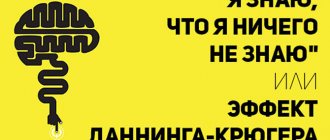- October 10, 2018
- Success stories
- Maria Mariyka
Every second person has probably already heard about Occam's razor. This methodological principle is relied upon quite often, and in many situations this argument is considered sufficient to win disputes and all kinds of discussions. In such everyday discussions, described in simple language, Occam's razor turns into a reliable lever of pressure. After all, this is a key principle of logic and methodology, which is based on the authority of scientific facts. It is simply indecent to go against such an argument among culturally enlightened people. And it is unreasonable - if Occam's rule is used with reason.
What is Occam's Razor?
The postulate in question is expressed in the words “Do not produce entities”
, or
“New entities should not be multiplied (multiplied) unnecessarily
.
More modern versions are: “If you have two equally effective ways to solve a problem, choose the simplest one
,” or
“The simplest explanation is likely to be more accurate than the more complex one
.
In other words, the simplest explanation is preferable to the more complex one. In any incomprehensible situation, you should first of all focus on simple solutions, and reject more complex actions (at least until easier ones have been tried), “cut off” with a conventional razor. Let's return to our example with the operator: when asking you about rebooting the equipment, he chooses the simplest path. And if a reboot does not help, it will begin to sort through and cut off other options - from simple to complex.
Important: Occam’s razor is not a statement, but a so-called maxim. In itself, it does not prove or disprove anything, but only serves as a tool for confirming and challenging
.
This philosophical postulate is based on two principles:
- The principle of economy
, which states that it is better to do something with less effort than to put in more effort. - The principle of plurality
- if you can get by with a small number of actions, you should do so.
Historical excursion
In the publication “Ockam. Philosophical Writings. A Selection Edited and Translated by Philotheus Boehner” (New York, 1957), a specialist in the history of medieval philosophy Boehner Philotheus reports that the author often gives Occam’s razor in the following formulation:
“One should not assert much without necessity” (Latin: Pluralitas non est ponenda sine necessitate). Ockham put it more clearly:
...multiplicity should never be assumed without necessity... [but] everything that can be explained on a number of grounds from the difference of matter - this can be explained equally well or better with the help of one reason.
Sometimes the principle is expressed in the words “What can be explained by means of less need not be expressed by means of more” (Latin: Frustra fit per plura quod potest fieri per pauciora).
Common formulations of a similar principle “entities should not be multiplied unnecessarily” - lat. Entia non sunt multiplicanda sine necessitate or lat. Entia non sunt multiplicanda praeter necessitatem - do not appear in Occam's works. The first formulation is recorded for the first time in the commentary of the Franciscan John Pons (Johannes Poncius) to the edition of Duns Scotus's Opus Oxoniense in 1639. The second formulation was first noted in 1654 by the German philosopher Johann Clauberg.
Ockham himself formulated this principle, apparently, primarily to confirm the existence of God.
History of appearance
The maxim in question is associated with the monk and philosopher William of Ockham
(that is, from Occam's village), who wrote in his works: "What can be done on the basis of fewer assumptions should not be done on the basis of more assumptions."
But in fact, this idea was not discovered by him; he only reformulated a saying that was used by Aristotle in the 4th century BC.
e. The name of the technique comes from the name of a small English village in Surrey.
Officially, Occam's razor appeared later, and the clergyman did not suspect that the technique would be given his name. The razor in the title is mentioned as a tool for cutting off unnecessary entities. The latter were understood as any theories/facts/assumptions that do not have empirical confirmation
, that is, evidence obtained as a result of experiments, observations or other actions that can be recorded using the senses.
The method is sometimes called Occam's blade, and also called the Principle of Thrift or the Law of Economy.
It is interesting that Ockham himself wanted to prove the existence of God with the help of a “razor”. He wrote that "nothing should exist without an explanation of a cause, unless it is self-evident or proven by the pages of Holy Scripture." Occam believed that an explanation is not valid unless it is proven by experience, the Bible, or contradicts common sense. At the same time, he was confident that the existence of God is undeniable, because religion is based on faith, not on evidence, and in this matter he did not rely on science.
To complicate is simple, to simplify is difficult
An example with a gearbox in a car
Automatic transmissions in cars are easier to use, but more complex to design and manufacture. Manual transmissions in cars are more difficult to use, but easier and cheaper to make.
An example of Pascal's thought
This idea is well illustrated by the words of the French scientist, philosopher and writer Blaise Pascal (1623-1662). At the end of one of his letters, he wrote: “This letter turned out to be longer only because I did not have time to write it shorter.”
Another famous translation: “I didn’t have time to write a shorter letter.”
The meaning of the expression: to compose a short, logical and meaningful text (and, accordingly, think about it) you need much more time than to simply record on paper all the thoughts that come to mind on one occasion or another. In the latter case, verbosity is inevitable.
Why was this principle formed?
One of the reasons for the appearance of this principle is the tendency of many people to constantly complicate everything. To make entities and things simple requires much more strength, energy, knowledge and mental fuel.
This is especially evident among young specialists in their fields of activity. Until a person has gained experience and has a narrow outlook, he usually begins to come up with complex solutions.
How to use the method
Is it possible to use a philosophical presumption in the realities of modern life? Yes, as a tool for making decisions and choosing an algorithm of actions
.
If you don’t know what to do or what to choose, Occam’s blade can tell you which direction to move in – at least at the beginning of your path.
This principle can also be used to construct a theory or explanation in the absence of evidence. Until you have verified facts, you can accept the simplest solution that describes what is happening as the truth. This implies that this conventional theory must be modified according to emerging evidence.
[edit] Links
- An accessible, albeit far-fetched explanation for inquisitive minds in the form of a sci-fi story. There are aliens and a universal conspiracy, Sturgeon knows how.
- Use of Occam's razor in controversy with creationists
- Why Occam's razor fails.
| [ + ] Occam's razor Matan | |||||||||||||||
| |||||||||||||||
How to apply Occam's blade in practice?
Despite the fact that Occam's blade is a philosophical, theoretical postulate, it also finds application in everyday life.
Choose the simplest explanation, solution, algorithm of actions
Let's imagine a situation in which the same phenomenon can be explained:
- using three entities (facts, phenomena, terms, rules);
- with the help of four entities.
If both of the above solutions lead (or could potentially lead to the same result as a result of your actions), you should choose the first one.
Example
Let's assume that your network cable is malfunctioning. Externally, it is intact, it has not been pinched or cut anywhere, so most likely the problem is in the connection point: either with the computer or with the router. At the same time, the router is within reach (one entity - take it and check), and in order to check the connection with the system unit, you need to move the bedside table, crawl under the table, untangle the tangle of wires, find the desired connection in an awkward position... (many entities). It is logical that in such a situation you should first check the connection to the router.
Choose the simplest and most logical explanation
First of all, it is necessary to exclude overly complex options.
, requiring a conglomeration of entities.
Also, assumptions that cannot be confirmed empirically
are removed: observation, measurement, etc. In other words, everything that is not perceived by the senses or is too complex an explanation of the existing facts should be cut off here.
Example
Let's say we wondered why it gets dark at night. We explain this by saying that the Earth revolves around the Sun, and when one of its sides turns towards the sun, the other plunges into darkness, so night falls.
But we can imagine a more interesting option: once a day, a giant dragon living in the sky steals the Sun and hides it in a bag, and after a few hours the reptile gets hot, and it releases the giant fireball back. But after a while she tries to steal the sun again, and so on in a circle.
Based on Occam's philosophy, the last idea should be cut off, because it is nothing more than a heap of entities. We already have a simpler explanation, based on many years of observation of celestial bodies by scientists. This is exactly what is true.
In addition, we exclude entities that are not perceived by the senses, and no one has ever seen a dragon with a bag.
Is Occam's razor universal?
Unfortunately, this method cannot be called universal. The main disadvantages of Occam's razor
:
- Subjectivity of opinion
There are disagreements regarding what is considered simple, since this is a subjective concept. - Simplicity is not always the same as truth.
Often, an elementary explanation or solution to a problem is incorrect.
Sometimes using a razor leads to a dead end
. For example, believers may appeal to the concept of Occam's razor to prove the existence of God - because it is easier to accept that he created the world around us than to think that the complex and orderly universe around us was the result of the Big Bang. But atheists can also say that it is easier to explain the creation of the world using the laws of physics than to resort to using another entity - God.
In addition, any conspiracy theories are strictly cut off with a razor.
, because the explanations of those who believe in them tend to be complex and involve a large number of participants.
In 1983, a group of scientists from Oxford developed the Occam programming language, named after the philosophical principle. His goal was to keep the coding process simple.
Notes
- ↑ 1 2 Smirnov G. A.
Occam, William // New philosophical encyclopedia / Institute of Philosophy RAS; National social-scientific fund; Pred. scientific-ed. Council V. S. Stepin, deputy chairmen: A. A. Guseinov, G. Yu. Semigin, student. secret A. P. Ogurtsov. — 2nd ed., rev. and additional - M.: Mysl, 2010. - ISBN 978-5-244-01115-9. - ↑ 1 2 3 4 5 6 Thorburn WM
The Myth of Occam's Razor // Mind. - 1918. - Vol. 27, No. 107. - P. 345–353. — DOI:10.1093/mind/XXVII.3.345. Archived from the original on December 15, 2011. (copy) - Parsimony, Law of // Encyclopædia Britannica, 1911 (English)
- Elliott Sober
Ockham's Razors / Cambridge University Press, 2015 - Comte-Sponville A.
Occam's Razor (Rasoir D`Okham) / “Philosophical Dictionary”. - Litres, 2015. - ISBN 9785457745698 - Carroll, 2005.
- Dushenko K.V.
World history in sayings and quotes. - M., 2008. - See Diogenes Laertius. About the life, teachings and sayings of famous philosophers. Book 6.











